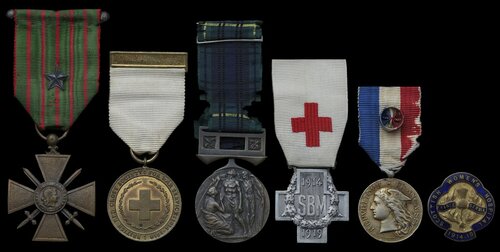
Auction: 22001 - Orders, Decorations and Medals
Lot: 334
The Rare French Ministry of War Gold Medal for Epidemics group of five awarded to Dr. A. M. S. Berry, one of the original six 'Women of Royaumont'
British Red Cross War Service Medal 1914-18; Scottish Women's Hospital Medal; France, Republic, Medal of Honour, Ministry of War Gold Medal for Epidemics, silver-gilt, reverse embossed 'Miss A. Berry 1917', silver-marks to edge, with miniature rosette on riband, in case of issue; Commemorative Medal 1914-1919, Relief Society for Military Wounds ; Croix de Guerre, in card box, slight polishing, overall very fine (5)
(Jessie) Augusta Berry, (née Lewin) was born in Marylebone, London on 26 August 1871, the daughter of Spencer and Jessie Lewin of 25 Wimpole Street, Marylebone. It is likely her progression was much the same as that of her sister Octavia Margaret Sofia Lewin who was educated at Queens College in Harely Street before joining Girton College to study Natural Sciences, certainly Berry appears is listed as studying this on the 1891 Census.
Entering the London School of Medicine for Women it was here that Berry first encountered her future Chief, Francis Ivens who was to become the key founder of Royaumont (her Scottish Women's Hospital Medal sold in these rooms). Marrying at St. Andrew's Church, Marylebone on 4 December 1911 to Grosvenor Berry, a farmer, little is known of her career prior to the war. This suggests that her arrival at Royaumont in November 1914 was at the request of her old friend Ivens rather than as the result of her work. Despite this Berry soon established herself as an immensely capable member of the Royaumont staff as The Women of Royaumont states:
'A prop of the hospital from the beginning, she put her hand to everything from ward dressings and toe-nail cutting to cleaning out drains and cutting wood. She also had a fine brain and a very tender heart... she is very sweet and unselfish and would do anything on earth for the patients, and is a very skilful and devoted doctor. She has a driving sense of duty that could on occasion be puritanical. She could never rest while anything remained to be done - so she never rested.'
This attitude was of immense help as, from the first, there was resistance to the mission of the Scottish Women's Hospital. The rejection of the British forced Ivens to offer their services to the French and while they did accept the drive to turn the Abbaye de Royaumont from an abandoned and dilapidated ruin into a 100 bed hospital was a monumental task. Nevertheless they succeeded and on 13 January 1915 Royaumont opened as the Hôpital Auxiliaire 301 and from that point on its 100 beds were always filled. Working hard under Ivens, or 'Madam la Colonelle' as she was affectionately known, was strenuous and even dangerous as on several occasions surgeries were performed by candle light and under bombardment from enemy guns.
This pressure combined with the horror of the injuries she witnessed and the strain of overwork in keeping the hospital running began to tell upon Berry. She stayed by her friend for the duration of the war but suffered a mental breakdown in the August 1918 which saw her institutionalised. It is believed that she never again practised medicine but instead lived with her husband until her death at Maidenhead, Berkshire on 12 August 1955; sold together with copied research including old auction listings, medal rolls and the recipient's marriage details as well as an original Scottish Women's Hospital 1914-19 commemorative badge.
Subject to 20% VAT on Buyer’s Premium. For more information please view Terms and Conditions for Buyers.
Sold for
£1,100
Starting price
£450




